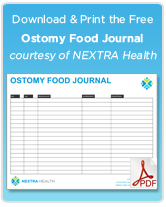Most folks generally don’t think too much about what/how they eat and how it affects their waste (short of feeling ill or diarrhea). The reasons for this are simple – it’s generally a minor duty or inconvenience in a typical day, just like sleeping or eating or personal hygiene.
When it comes to what foods to eat, one thing is certain: nobody understands how foods affect digestion or how food travels through the body like an Ostomate does.
That’s because for an ostomate, there is no control when a pouch fills with waste and gas without the intelligent management of diet & nutrition. With this in mind, one needs to consider questions about their diet so pouching needs become more predictable and therefore can be handled with optimal health and minimal complications: What makes things move too quickly? What stops things from moving (food blockages)? Are there foods that can’t be digested properly? What causes pouch output to be more liquid or more solid? Which foods create more odors? Which foods produce more gas?
Being able to answer these questions for yourself will make life much easier!
Basic tips about diet and nutrition for ostomy:
Chew Yer Food – It helps digestion and slows your eating down a bit. It’s a good general diet tip anyway; you’ll know more reliably when you’re full so you don’t overeat and swallow less gas-producing air. Like your mother always aid: Don’t talk with your mouth full. You will also have less likely chances for intestinal blockages around the stoma.
Eat Adequate Portions and Do It Often – Avoid overeating in one sitting and avoid skipping meals, both of these activites can result in producing excess gas.
Stay In Shape – Stay in shape and you’ll avoid a lot of stoma problems. Being overweight puts unnecessary pressure on your guts and your stoma.
Drink Lots of Fluids – Fluid loss is especially common in those who have lost much of their large intestine, so drink lots of water.
Make Scheduled Alterations to Diet – When you find foods you can digest well, test trying different types of foods and adding them to your diet one at a time. This way you’ll notice the changes that particular food can cause. Which leads into the next tip…
Monitor Movement – Keep a log of what you eat and when, and then make a note of the condition of your stoma and pouch output. This way you can start to see patterns and determine the best diets with all the foods you like. If you notice a change in pouch output, try a food several times to be sure its a consistent change and you’ll have a pretty good idea of how it affects you.
Foods to Avoid – Food Blockages
Generally it’s accepted that fiber aids digestion, but especially with illeostomy (small intestine), undigested fiberous foods can cause complications and food blockages. So can not checking your food enough. (See the tips above).
Some examples of foods that can cause these blockages are: corn, dried fruit, hotdogs/sausages, pineapple, skins from fruits and vegetables. If you or your child experiences belly cramps, watery stool, a swollen stoma, or nausea it could be a sign of food blockage, consult a nurse and physician.
Foods to Avoid – Odors
Ostomy odor is created by bacteria breaking down certain foods, turning it into odorous waste and also sometimes creating odorous gases. This gas, like the stool, also makes it way into a pouch, filling it with air that must be released to prevent pressure from developing a leak, or worse, a pouch blowout.
While some pouches have integrated filters or can have a filter added to them, it is also a good idea to avoid odor-causing and gas-forming foods. Below are some examples of foods that affect most individuals:
Some foods that do cause odors:
Asparagus, coffee, garlic, prunes, beans, cucumbers, green peppers, radishes, brussel sprouts, eggs, milk, turnips, cabbage, fish, onions, vitamins/certain drugs, alcoholic beverages.
Some foods that help decrease odors:
Buttermilk, parsley, yogurt, cranberry juice, spinach.
Some foods that produce more gas:
Apples, soda, dairy products, onions, asparagus, drinking straws & chewing gum (you’ll swallow more air), melons, beans, mushrooms, corn, broccoli, spinach, nuts, cabbage.
One final note about digestive odors: Another product that may help with gas and odors are Devrom Tablets. Taken up to four times daily, they help control the odors of digestive gases with bismuth subgallate. This is, of course, not meant as a replacement to intelligent dieting, but if certain foods you enjoy make you gassy then a couple of Devrom tablets right before you eat should do the trick.
More Food for Thought – Thickening and Thinning
Some foods will also change the consistency of the stool, and depending on the type and adhesion of a skin barrier you’re using, more liquid can harm the adhesion of the barrier and cause it to leak, never a pleasant experience! Here are some examples of foods, take note how they affect you:
Some foods that will thicken pouch output:
Yogurt, bananas, milk (preferably boiled), creamy peanut butter, breads, cheeses, pastas, potatoes, rice.
Some foods that thin pouch output:
Fruits and fruit juices, chocolate, green beans
When Diarrhea Happens
Sometimes diarrhea happens, which for anyone results in fluid loss and loss of two essential minerals needed for good health: potassium and sodium. Dehydration is always a concern with diarrhea for anyone, and fluid retention can be even more serious for an Ostomy patient. When diarrhea happens, it’s good to get plenty of fluids along with potassium and sodium to stay healthy, so the foods below should be considered:
Some more foods high in potassium:
Milk, Chicken, beef, fish, pork, turkey, lima beans, V8 Juice, apricots, bananas, avocado, tomato juice, potatoes, broccoli, grapefruit juice, oranges and orange juice, watermelon, strawberries.
Foods high in salt:
Salt is definietly not hard to find. Simple table salt will get you sodium, along with most pre-packaged foods, canned soups, and seasonings.
This guide from the University of Pittsburg Medical Center (and the source for some of the data in this article) gives many suggestions on foods that are safe for those with diarrhea and ostomy, along with a beverage recipe to help keep you hydrated and make sure you’re not losing potassium and sodium: http://www.upmc.com/HealthAtoZ/patienteducation/Documents/OstomyNutrition.pdf
Here’s the recipe:
- 1 teaspoon salt
- 4 teaspoons corn syrup
- 1 teaspoon baking soda
- 1 6-oz can of frozen orange juice
- Enough water to make 1 quart of beverage.
Stay Informed and Stay Healthy!
I suggest reading this thorough and useful guide on ostomy and nutrition from UOAA as well. It’s a PDF you access and even save to your computer for reference:











No one ever discussed, or helped me to plan my diet. So, I eat basic and simple – avoiding vegetables, gravies, juice, ice cream and desserts. Can you recommend a book specific to “eating healthy with my Stoma”. thank you
Does non alcohol drinks and pop cause l
Illostmy bags to pop off
I’ve had a stoma for 28years. I find with age comes malabsortion. Ive lost basic vitamins and other essential minerals. Watch your diet and get all info you can. I also was not informed about all conditions that could have taken place after raditation treatments. It caused to have brunt intestines , with more removal of intestines. Now facing more probllems. Get and ask questions from all of your doctors. Find a good gastroenteritis. Good luck !!!!
Wish they would put out an operation manual on how to work this thing, I’ve had my colostomy for two years and I’m still trying to figure it out, things that didn’t work for it last year are working this year, I never knew for almost two years I was losing potassium and sodium I had cut out all salt from my diet when I got it,I became dehydrated several times light headed all the time and come to find out its because I was losing alot of minerals , but with major research I am slowly finding out how to work with (collin) my colostomy to improve my life.
I have had my illeostomy since Nov 2016. So quite new, everything was okay till I ate rice the other day and now I’ve got thick output and have had to change my bag every night for last 3 nights now ,getting really depressed with this pancaking,I drink tons of water n juice but nothing is helping I’ve tried all things people have suggested ,what can I do so fed up not sleeping well .
MY BAG KEEPS COMING LOOSE AROUND THE BOTTEM . hOW CAN I KEEP IT SEALED ?
Why is the buttermilk good to reduce odor??!
I would like a book or sample of some diet or meal plans, I have a el I os to my I don’t have any idea of what I’m doing right or wrong, please